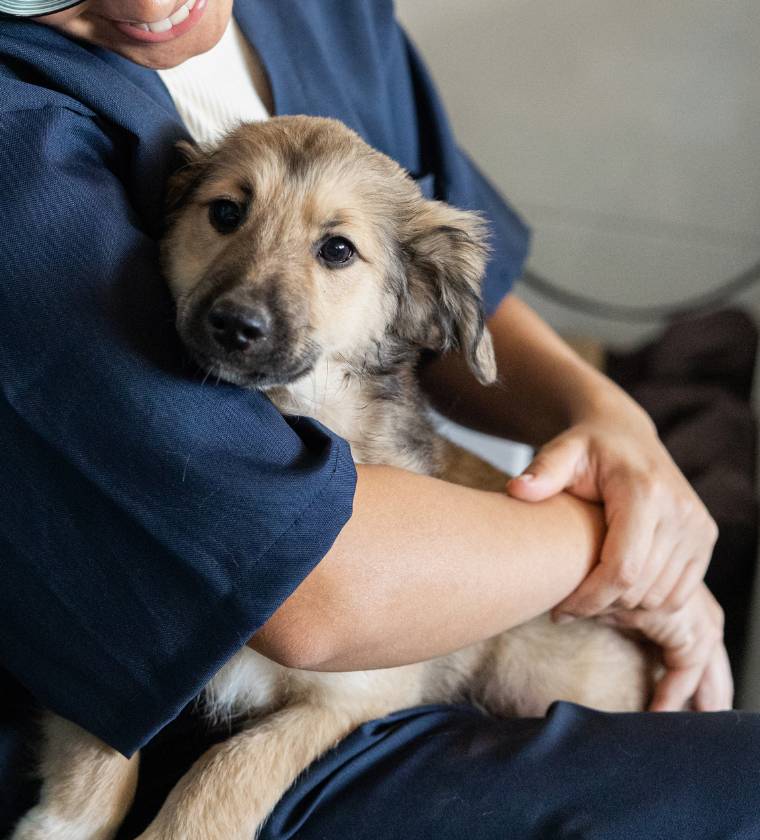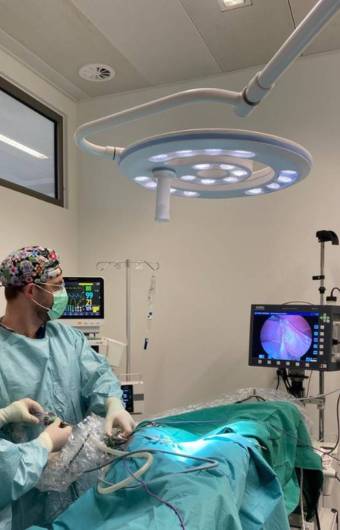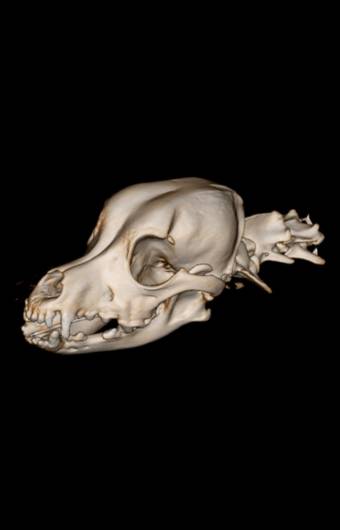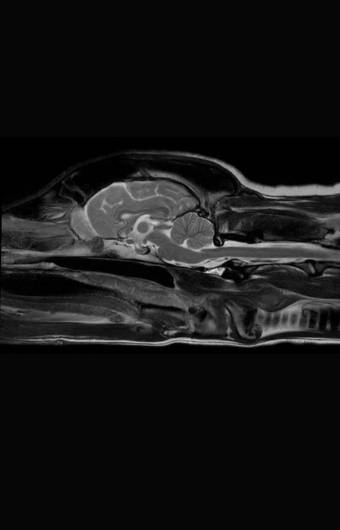Veterinary psychiatry and behavioral medicine :
understanding and helping your pets in Geneva
Behavioral disorders are a frequent cause of suffering for animals and their owners. At the Vétélys clinic in Vernier-Genève, we specialize in behavioral medicine and veterinary psychiatry. With a personalized, caring approach, we help to treat behavioral disorders and re-establish a harmonious relationship between you and your pet.
Whether it’s fear, autonomy problems, hyperactivity, social problems, aggression or uncleanliness, our team uses its expertise, recognized in Switzerland and internationally, to analyze the root causes of your pet’s behavior and propose appropriate solutions.

Veterinary behavioral medicine Geneva
When should you consult a veterinarian?
Is your pet in a worrying condition? Find out the main reasons to contact our behavioral medicine and veterinary psychiatry service in Geneva and be treated by one of our veterinarians.
What are the warning signs?
Certain signs may indicate a disorder requiring specialist consultation:
- Aggression towards humans, other animals or objects.
- Separation anxiety: crying, destruction, uncleanliness in your absence.
- Phobias or excessive fears: unfamiliar noises, places, people or animals.
- Compulsive behaviors: excessive licking, tail-chasing, incessant barking
- Urinating or defecating outside appropriate areas.
- Hyperactivity, destructiveness and learning difficulties
- Withdrawal without organic cause
- Disorientation or emotional degradation of the old animal
These disorders are often linked to emotional, cognitive or mood imbalances. They may be influenced by health problems or genetic predisposition, or triggered by major stress or a significant event. Prompt treatment can considerably improve your pet’s well-being.

Veterinary behavioral medicine Geneva
Our services in veterinary behavioral medicine
Is your pet in a worrying condition? Find out the main reasons to contact our behavioral medicine and veterinary pychiatry service in Geneva and be taken care of by one of our veterinarians.
In-depth behavioral assessment
Each consultation is a comprehensive assessment including :
- Taking a behavioral and medical history.
- Exhaustive collection of the clinical signs expressed by the animal
- Observation of the interactions between the animal, the veterinarian, its owners and the environment
- A complete clinical examination
- Identification of triggering and aggravating factors
- Identification of the owners’ skills in terms of communication and education of their pet
Personalized treatments
- Behavioral therapy: environmental modifications, elements of communication and cognitive therapy.
- Medication support: prescribing appropriate treatments (anxiolytics, antidepressants, mood and cognitive regulators) becomes essential in the case of severe disorders, when these prevent the effective implementation of behavioral therapy. The main aim of these treatments is to rapidly relieve the animal’s psychological and emotional distress.
- Educational support: working with an educator to help implement complex therapies.
Problems dealt with :
- Aggression, whatever the cause
- All diseases of fear: fears that are excessive in frequency and intensity and not adapted to the context, including care phobia
- All diseases of self-control: hyperactivity, hypersensitivity and attention disorders
- All diseases of attachment in dogs: separation anxiety, whatever the cause
- All diseases of social integration in dogs: aggression or disturbing behavior (marking, destruction, public expression of sexuality, etc.).
- All relationship disorders in cats: recurrent aggression by household members
, human or animal - All territory disorders in cats: urinary and fecal marking, excessive scratching.
- All psychiatric illnesses: dissociation, bipolarity, autism in dogs.
- All age-related illnesses: emotional and cognitive dysregulation.
- All behavioral disorders in small mammals (ferrets, rabbits, guinea pigs, etc.) and pet birds (parrots, serins): aggression, feather plucking, self-mutilation, etc.
Emergencies 24/7
Veterinary behavioral medicine Geneva
Procedure for a psychiatric consultation for your pet in Geneva
A consultation in behavioral medicine and veterinary psychiatry in Geneva takes place in 2 stages: the objective of the consultation and then the methodology, which may involve additional examinations.
Consultation objective
Evaluate whether your pet’s brain is functioning optimally or whether there are any malfunctions.
Methodology
- Analysis of behaviors reported by the owner.
- Direct observations by the practitioner and clinical examination of the animal.
- Identification of symptoms:
– Abnormal behaviors (e.g. compulsive licking).
– Normal behaviors with abnormal frequency or intensity (e.g. insomnia, bulimia). - Further investigations if necessary.
- Diagnosis to explain the whole clinical picture and guide prescriptions.
- Explanation of diagnosis, treatment and therapy to owners.
Answers to your questions
Find out more about the behavioral medicine and veterinary psychiatry service in Geneva, by Vétélys
What's the difference between a dog trainer and a veterinary doctor specializing in psychiatry?
A dog trainer is a professional who specializes in the education and communication of dogs. A veterinary psychiatrist is a veterinary doctor who specializes in treating the brain disorders that cause behavioral problems. He prescribes complex therapies that require the help of specialized educators.
How long does it take to correct a behavioral disorder?
This depends on the severity of the disorder and the extent to which it can be managed. Some improvements are visible quickly, but some chronic disorders may require several months of treatment.
Will my pet need medication?
Medication is prescribed to enable behavioral therapy to be effective quickly and to relieve suffering. We don’t hesitate to give medication to relieve physical pain; the same must be done when mental or psychic suffering is detected.

Testimonials
They’ve been to the Vétélys Clinic
Efficient telephone answering. Very good explanations. Fast appointments. Efficient on-site services. Clean, large practice and parking spaces available 👍👍
Even our cat likes to go there :f
A veterinarian who always listens with convincing solutions. I recommend her
Always professional, never any problems.
Super vet he saved my dog
Personal welcoming and warm
THANK YOU THANK YOU FOR EVERYTHING
The vet was very kind, answered all our questions competently and made herself available. Clean premises. Very satisfied.
They are always available to help us with our dogs.
Professional vets who care for animals and their owners.
Every visit is greeted with a smile and the kindness of a great team.
Bravo and thank you for our animals.
Expert insight
A few tips to promote your pet’s behavioural well-being:
- Socialise from an early age: exposing puppies (before the age of 3 months) and kittens (before the age of 2 months) to a variety of situations is essential to make them more adaptable.
- Provide a stimulating environment: games, walks and interaction all help to build emotional stability.
- Watch for warning signs: growling, tense body postures, licking the lips, avoidance behaviour or trembling indicate discomfort.
- Never use physical punishment or fear as an educational or behavioural re-education tool: prefer positive reinforcement (a treat, a caress or a gentle word) to encourage good behaviour.
- Use our online behaviour disorder detection tool:
– Dog: https://noledge.org/questionnaire/test-comportemental-chien/
– Cat: https://noledge.org/questionnaire/test-comportemental-chat/
Dr. Méd. Vét. Stéphane Bleuer, European specialist in behavioural medicine, and Dr. Méd. Vét. Ariane Maillard, veterinary behaviourist, advise
‘Your pet is a sensitive being, capable of feeling emotions, displaying cognitive skills and experiencing mood swings. When an imbalance occurs in their brain circuits, they can develop behavioural disorders that affect their well-being and yours. Our role, as specialists and experts, is to detect, treat and prevent this mental and emotional suffering. And it’s fascinating’.
Consultations
-
Initial consultation (1h to 1h30): CHF 300 to 350.
-
Follow-up consultations (30 to 45 min): CHF 100 to 150.
-
Consultation report and personalised therapy plan: included in the consultation.
-
Contact with the attending veterinarian and transmission of information
-
Additional tests (if necessary): estimate on request.
A detailed quote is provided based on your pet’s specific needs.
Clinic specialties
Discover our other specialties













